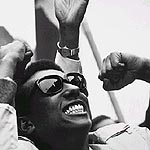







|
Stokely Carmichael or Kwame Ture

Kwame Ture
(b. July 29, 1941, Port-of-Spain, Trinidad), activist and writer who inaugurated the Black Power Movement of the 1960s.
Although Stokely Carmichael was not the first to use the phrase "Black Power," he made it famous. Critical of Martin Luther King Jr's. peaceful approach, as chairperson of the Student Nonviolent Coordinating Committee (SNCC) in the 1960s, Carmichael advanced a militant stand on civil rights. A native of Trinidad, Carmichael moved with his family to a mostly white neighborhood in the Bronx, New York, when he was 11. He graduated from Bronx High School of Science in 1960 and, four years later, from Howard University in Washington, D.C., with a bachelor's degree in philosophy.
In addition to studying philosophy, Carmichael became involved in civil rights protests during his years at Howard. He participated in demonstrations staged by the Congress of Racial Equality, the Nonviolent Action Committee, and SNCC. He was arrested as a Freedom Rider in 1961 and served seven weeks in Parchman Penitentiary for violating Mississippi's segregation laws. Carmichael returned to the South after college and devoted himself to the organization of SNCC's black voter registration project in Lowndes County, Alabama. There, he also founded an independent political party called the Lowndes County Freedom Organization that used the black panther as its symbol.
Carmichael became the chairman of SNCC in 1966. He catapulted into the national spotlight that August, when he ended a speech with a call for "Black Power." Black Power became a rallying cry for black protests during the 1960s and 1970s, and it also created a wedge between SNCC and more moderate civil rights groups. Defined in many ways, Black Power emphasizes independent political and economic development by blacks as a necessary element of social change. Carmichael and political scientist Charles Hamilton elaborate on the concept in their book, Black Power (1967).
A 1967 world tour to publicize the black struggle in the United States brought Carmichael more controversy in Washington, D.C. His passport was revoked for visiting Cuba and, when he returned to the United States, Carmichael faced indictment for sedition. He was never prosecuted, however. The following year, Carmichael became prime minister of the Black Panther Party.
In 1969 Carmichael began to focus his political activity on Africa. After the Black Panthers, he went to work for the All-African People's Revolutionary Party in Ghana. That same year, he and his wife, South African singer Miriam Makeba, went to live in the African nation of Guinea. In 1978 Carmichael took the first and last names of his mentors, Kwame Nkrumah of Ghana, and Ahmed Sékou Touré of Guinea. Now known as Kwame Touré, he continues to travel and lecture about U.S. imperialism, Pan-Africanism, and socialism. His second book, a collection of speeches and essays entitled Stokely Speaks, appeared in 1971.
Continue ... Kwame Ture 1941 - 1998
Trinidad & Tobago | TriniView Home | Trinicenter Home
Any problems with this page? Contact our webmaster.
Education 2000@ TriniView.com
|





